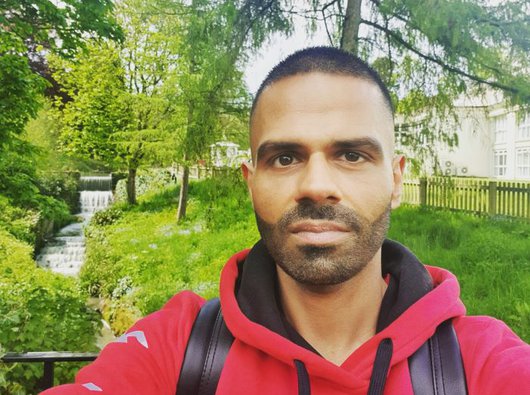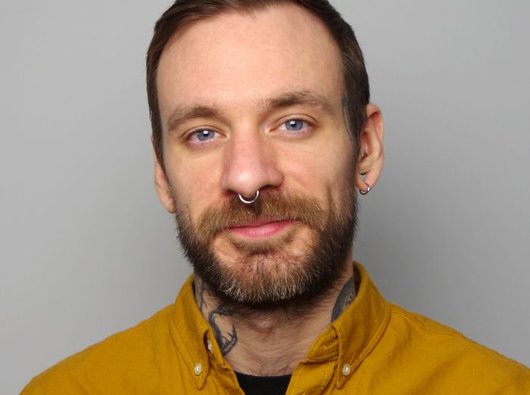Coping with changes to your body or appearance
Side effects from treatment, as well as blood cancer symptoms themselves, can change the way you look and feel. For many people with blood cancer, this is one of the hardest and most worrying things during, and after, treatment.
What is body image?
Body image is the way that you perceive yourself. Your body image can mean many different things. It can be how you feel about the way that you look, how you see yourself as a person, your body, or your perception of how others see you.
When side effects change the way you look or how your body works, sometimes your body image can change too. There is often an adjustment period where it takes time to understand and relate to your different appearance. There is no right or wrong way to feel about these changes to your body.
Some people find that even if they don’t look different, they feel different because of blood cancer treatment. This can make them see their body differently or worry that others do. This is normal and part of adjusting to your blood cancer diagnosis.
Changes to your body
Blood cancer treatment can cause many changes to your body. These changes are different for everyone. Some people may not experience any big changes, while others may experience several. Side effects can change the way you look and the way that your body works.
Changes to the way you look
Some of the changes blood cancer treatment can cause to the way your body looks include:
- hair loss, affecting the scalp and body hair, including eyelashes and eyebrows
- skin changes such as rashes, dry skin, redness, and spots
- weight changes (losing or gaining weight)
- lymphoedema (swelling)
- Hickman® line or PICC line (some people have a tube inserted into their chest or arm for giving treatment).
Changes to the way your body works
Some of the changes blood cancer treatment can cause to the way your body works include:
- brain fog
- fertility problems
- sexual function and change to your libido (sex drive)
- nerve damage
- mobility changes
- strength changes
- fatigue (extreme tiredness)
Emotions you might have
You might have some or all of these emotions at different times when you're coping with side effects. These are all normal reactions to have.
Grief
It’s easy to underestimate the impact that side effects can have on your body image. Grieving for the way you looked before treatment is often part of the process of accepting these changes. There can be a sense of loss as your body changes. It takes time to adjust to a changed appearance and some changes will be temporary. People often talk about a new relationship with themselves that emerges after treatment.
Anger
The impact of side effects sometimes makes people feel angry at how little control they have over how they look and feel. You might also feel that what's happening is unfair, or that there are already too many problems in life to cope with blood cancer as well. It can be hard to know what to do with feelings of anger, and they can sometimes get directed at the people closest to you, or to yourself.
Being open about anger and telling someone how you feel will help. Anger is a natural emotion. Try to find out which thoughts are keeping the anger going - what you are thinking about when you feel angry - so you can try to re-write or distance yourself from those thoughts.
Detachment
Some people feel that their body becomes medicalised during blood cancer treatment. Spending lots of time in hospital and going through intense treatments can make you feel distanced from your body or feel that it’s let you down in some way.
Low self-esteem
Feeling comfortable in your own skin is something lots of people struggle with. But it’s important to recognise how much more you are than the way that you look or feel in each moment. Remember all the other things that make you ‘you’, not just your appearance.
Sometimes a changed body image can cause positive emotions too such as gratitude for how hard your body is working to get better, an appreciation of the strength of your body and acceptance of the changes that are happening.
Dealing with visible reminders of what you are going through is hard. Having my outward appearance change made the cancer feel so much more real.
Sunny, diagnosed with non-Hodgkin lymphoma in 2019.
Read Sunny's story about how he coped with changes to his appearance.

How side effects impact your identity
For some people, side effects and symptoms are separate from how they view themselves as a person. For others, changes to the body are strongly linked to their identity and self-image. This can make it harder to accept and process the physical changes that blood cancer treatment can cause.
It is normal for our sense of identity to be linked to the way that we look. Many aspects of life can contribute to the way that we see ourselves. For example, the work that we do, the people we spend time with, our personality, and our goals, attributes and achievements. When something in our life changes, that can change the way we see ourselves.
It can be difficult to feel like your usual self when you don’t look like your usual self. Naming this loss, or the thought you’re having (“I don’t feel like myself at the moment”) can be a useful starting point.
It’s natural for us to anchor our identities on our appearance or activities, but these may be outside our control. When this happens, another useful anchor for our identity is our values – personal qualities we relate to and want to show in our daily lives. Qualities like being helpful, kind, determined or curious contribute as much to your identity as your appearance or your activities.
It will help if you can recognise and give yourself credit for dealing with a significant challenge you didn’t expect, and that despite the ups and downs, you have managed to adapt and cope with it. Acknowledging this can help you feel resilient and make this resilience a part of your identity.
When I was diagnosed, I had several questions that were specific to being queer and having blood cancer. It was frustrating not having inclusive information that was relevant to my experiences.
Stewart (they/them), diagnosed with CML.
Read Stewart's story about finding and creating a support network within the LGBTQ+ community.

What can help me feel better about my body?
Blood cancer treatment changes what is normal to you. This can be very unsettling and cause low self-esteem or changes to your body image. However, there are lots of things that can help you adjust and feel better about the changes happening to your body.
Be gentle with yourself and your body. Show yourself kindness and compassion in these changes. Your body is going through a lot and is doing its best to cope.
Doing activities that make you feel good can help you remember who you are, and to see yourself outside of your cancer diagnosis. Changes to your body can sometimes make you feel less ‘you’. Picking up hobbies can be a great way to feel more in touch with yourself, and doing things that make you happy and feel confident in yourself can improve your overall self-esteem.
Tune in to how you are feeling. Reconnecting with your body through yoga, exercise, massage, or mindfulness can change how you feel about your body in a positive way.
It’s okay to not be okay. Sometimes these changes can be really difficult to deal with and there is no quick fix. Blood cancer treatment can be challenging, and your body is going through a lot. It’s okay to recognise this and give yourself time to process how you feel about it. Showing yourself kindness, patience and compassion in these moments can make them easier.
Wear what makes you feel good. There’s nothing wrong with wanting to feel more confident in the way that you look. Experimenting with new clothes styles, make-up, hairstyles or wigs can help you feel more empowered. There is no one way that you should look with cancer. You can decide how you want to present yourself and buying new clothes or trying a new look could be helpful.
Eating well and getting enough sleep will make a difference to how you feel in yourself. If you are struggling with these, see our information on sleep problems and eating well.
Accept yourself and what you are going through. This can be hard if you miss the way you used to look, or you look different to others around you. But there’s no ‘right’ way to look. The most important thing is how you feel on the inside, not how you look on the outside. You could try talking about your feelings with people who know you well. They will remind you of who you are, and that these physical changes don't change all the great things about you.
Coping with others reactions
You might be concerned about how other people will react to your changed appearance. Sometimes friends and family can be shocked at the changes, or not know what to say to you when you look different. This can impact your self-esteem and body image.
People find being open and honest with friends and family about their own feelings helpful in these situations. They will probably want to support you and show you that it doesn’t change anything. Talking about it can break the ice and show you are okay with them asking questions.
It is normal to worry about how someone you are romantically involved with will react too. You may worry whether they still find you attractive. It’s okay to ask for reassurance if you need to. Hearing what they have to say may help you feel more confident about the physical changes.
If friends or family have unhelpful reactions, it can make you feel isolated and unsupported. It’s okay for you to say how their reactions make you feel, including if you feel hurt. If your friends or family are unable to offer the support that you need for any reason, try to find support elsewhere, like online forums or through counselling. Then you can develop resources to be able to deal with this, and build a positive sense of self despite others’ reactions.
My period stopped after my chemotherapy. Unfortunately for me it didn't come back, and after having hormone tests, I was told I was peri-menopausal. I felt like I wasn’t a ‘normal woman'.
Jacqueline, diagnosed with diffuse large b-cell lymphoma in 2017.
Read Jacqueline's story about how she coped with an altered sense of body image.

What if I need further help?
It is okay to find the changes to your body difficult. For many people it can bring up all kinds of emotions. If these emotions are stopping you from doing things in your life, and it doesn’t get better, you might want to look for more support. It is okay to ask for help with dealing with your emotions around your changing appearance.
There’s no right time to seek support and you don’t have to wait until it gets harder - if you feel like talking to someone, then do. Tell your hospital team how you’re feeling or talk to someone from our Support team.

The emotional impact of side effects
A psychotherapist at King’s College Hospital who supports people with blood cancer answers your questions about the emotional impact of side effects.

Social anxiety and body image
Experiencing low self-esteem because of changes to your physical appearance can have other impacts too. Body image can play a role in developing social anxiety. People talk about not wanting to see other people because they look and feel different to usual. They worry about what others think about them now they have blood cancer and fear judgement about the way they look.
Social anxiety looks like:
You may want to start by spending time with someone that you trust in a place that you feel safe, or try a phone call with a friend to start off with. Experiencing social anxiety can be isolating but you are not alone in how you are feeling. You could ask your hospital team if there are any support groups you could join to talk about these concerns with people going through blood cancer treatment.
In most types of anxiety, our mind makes a lot of negative assessments and tends to exaggerate them. When we believe these things to be ‘true’ (rather than viewing them as our own thoughts) it makes us want to avoid situations or people. Avoidance can feel good – because for a moment we have managed to escape what we fear – but ultimately it increases anxiety because we never learn that we were worrying for nothing and that people are often a lot more kind, understanding and accepting than we feared. You may feel self-conscious the first time, but the more you allow yourself to be around and interact with others, the easier it can start to feel.
Trying to think ‘what would I say to a loved one who was feeling the same way?’ can help you access a more reasonable and compassionate perspective.